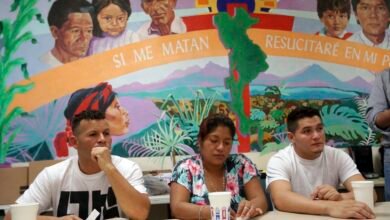After dispiriting election, Muslim Americans question whether politics is a game they can influence

(RNS) — In the last days leading up to the 2024 presidential election, a large swath of American Muslims agreed on one thing: None of the choices for president was a good one.
As President-elect Donald J. Trump’s victory became clear in the early hours of Nov. 6, the Wednesday morning quarterbacking began. While not a deciding factor — national exit polls showed that Trump won by energizing his base and drawing Latino men in greater numbers — the Muslim vote, for many, was meant nonetheless to get the attention of politicians, particularly Democrats.
Namely, Muslims voted their anger and grief over more than a year of war in Gaza and, more recently, in Lebanon. With the Democratic administration supporting and arming Israel, voting for Kamala Harris became for many an improbable choice, and voting a painful decision. “No one who wanted Kamala to lose wanted Trump,” said a Muslim organizer in Michigan who wanted to remain anonymous. “No one who wanted Kamala to lose (didn’t) empathize with Blacks. But their family members are dying now.”
An exit poll conducted by the Council on American-Islamic Relations showed 54% of Muslims voted for Green Party candidate Jill Stein, 21% for Trump and 20% for Harris, with another 3% voting for other third-party hopefuls. In Michigan, Stein drew 59% and Harris just 14%, according to CAIR, with other candidates getting about the same share as nationally.
The size of the vote for Trump took many Muslim political and governmental careerists by surprise, given his promise of mass deportations and his previous attempts to ban Muslims from entering the country. But as a whole, the election left Muslim Americans asking whether their community’s dissenting vote was effective. Will rejecting the Democrats’ “same old, same old” message gain anything?
Youssef Chouhoud, a political science professor at Christopher Newport University, said motivations behind third-party votes are misplaced. While “there’s a push towards more engagement outside the two-party model,” he said, many voted for a third party out of “fantastical, fairy-tale thinking about how we’re going to break the duopoly. I thought that was frankly irresponsible. By that same token, I thought the folks who were pedaling (Gaza) as a single party issue were also frankly irresponsible.”
The Michigan organizer said conversations are swirling — Muslim Democrats didn’t represent the community’s Gaza concerns well enough, some say; Harris barely mentioned Gaza in her campaign, others point out; Trump mentioned American Muslims in his victory speech, which Harris never would have done.
Those who stumped for Harris, meanwhile, point out that Democrats’ ignoring the plight of Gaza and Palestine, while a terrible thing, is a single-issue vote that could be addressed once Harris won and took office.
And so a decades-old debate reared its head: Should American Muslims disengage with traditional political and governmental work and stop seeking a seat at the table? Whether American Muslim political and civic leaders or government careerists should continue to work within the country’s two-party system is a reckoning going on in many WhatsApp group chats, meeting rooms and private conversations across the country.
Over the past two decades, Muslim activists have employed a strategy of working from the inside and the outside. A key example is Emgage, a Muslim political advocacy group, that works to get out the vote in even-numbered years and, between elections, to place Muslims in government-appointed positions.
But those who grew up in the decade after 9/11, said the Michigan organizer, had internalized the Islamophobia of the time. Raised to please people, American Muslims in their leadership style, their stances and the way they speak were not forthright about their beliefs.
Muslims “weren’t educated about Palestine and Gaza enough,” she said. They “were wishy-washy about how to talk about it, especially in interfaith environments; and three, not as tied to the entire ummah (Muslim community) as much as we were to our countries of origin and America.”
RELATED: Stonewalling Muslim voters on Gaza has become a bipartisan effort
My own reporting for the decade after 9/11 was full of Muslims trying to prove their worth as Americans, who were pushed by others to condemn any violence or terrorism (as well as often internally subscribing to the “model minority” mentality) around the world. Heading into another four years of Trump, how American Muslims work and fight for the things they want from their country is in a much different place than 2016.
The past year, the organizer said, has opened her eyes to the kind of engagement American Muslims should be doing. More than a year of watching Palestinian and Muslim children, babies, women and men displaced and blown up in attacks funded by U.S. taxpayer dollars has created disillusionment, and many say the current strategy isn’t working.
Chouhoud agreed that trying to effect change incrementally from within ends up watering down Muslims’ message. “But,” he said, “I also find valid the argument that if I can make things 1% better (by working within established political systems), why wouldn’t I try?”
In 2012, he worked on a “#MuslimsVote” project, which I also was a part of as the editor of Altmuslim, in which we published stories about voting, election issues, civic engagement and more. At the time, the engage/don’t engage question was perpetually being debated around topics like White House-driven CVE (countering violent extremism) programs, mobilizing and building Muslim political power or even attending White House iftars.
And like many others, Chouhoud is concerned about severing coalitions that American Muslims have worked to create to have a meaningful say in politics. “The fraying of these connections externally as well as schisms forming within our community, that’s really what I’m worried about.”
But Chouhoud also has an optimistic take, one I hope he’s right about: In 2006, Latino Americans “galvanized around protests against the immigration policies of George W. Bush’s administration. You ask any (Latino) organization now, they’ll tell you those 2006 protests were the genesis of mobilization efforts for so many leaders who are currently in these communities.
“This moment, as painful as it is, is going to pay dividends in mobilization efforts. Are we able to channel that energy properly? That is what is yet to be seen,” Chouhoud said. “But it is absolutely possible that we channel all this pain, all this grief towards something … that allows us to have a meaningful say when something affects us this broadly and this deeply.”
Source link




